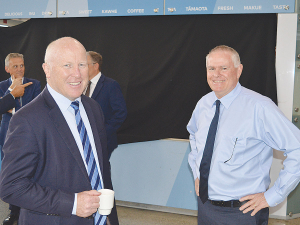Another Windfall for Fonterra Farmers, Unit Holders
Fonterra farmer shareholders and unit holders are in line for another payment in April.
 Fonterra chair Peter McBride (right) and chief operating officer Fraser Whineray at the annual general meeting in Rotorua last week.
Fonterra chair Peter McBride (right) and chief operating officer Fraser Whineray at the annual general meeting in Rotorua last week.
Fonterra farmers are being told to brace for another carbon emissions target.
The scope 3 emissions target encompasses carbon emissions that are not produced by Fonterra itself, but by those that it's indirectly responsible for - including farmers.
Before the end of the year, the co-operative board and management will be out discussing the target with its farmers.
Fonterra chief executive Miles Hurrell told the co-op's annual general meeting that it was sending "an early signal today that the co-op is considering setting a target for scope 3 emissions".
"Before the end of the year, we will be out discussing the target and what the flow-on effect for farmers might mean.
"We can't go into that detail until a target has been identified, but I can explain the rationale for it.
"In short, it comes down to us collectively meeting the climate change expectations of our stakeholders, and the risk if we don't."
Now that Covid-19 restrictions have largely been lifted, Hurrell and board chairman Peter McBride have been spending time in key markets.
Hurrell says the subject that dominates conversations with customers and debt capital providers is sustainability.
"Our high value customers are setting emissions reductions targets and looking for our help. If we can't give them confidence that we will help them achieve their targets, they will look to our competitors - including using alternatives to milk."
McBride says, from his perspective, setting a scope 3 target will help Fonterra to maintain competitive access to some of key international markets.
He points out that the EU has proposed a carbon border adjustent tax on certain carbon-intensive goods.
"They are subject to a carbon emissions price via the EU's Emissions Trading Scheme.
"Agriculture is not currently in scope, but it is possible it will be brought into the scheme. Others will follow.
"I expect these types of trade barriers to become more frequent as international governments respond to their own climate commitments."
McBride says it's important that Fonterra gets ahead of them early. He points out that these changes are not just compliance.
"They are an opportunity for us to leverage our natural advantages.
"Despite the very real challenges we as farmers have in front of us today, the board remains confident and excited by the future prospects for our co-op and New Zealand dairy."
The 5+ A Day Charitable Trust has launched a collection of affordable recipes designed to turn everyday vegetables into seasonal stars.
Jane Mellsopp has been confirmed as the new Government Appointee to the New Zealand Meat Board (NZMB).
To celebrate the tenth anniversary of its annual Good Deeds competition, Rabobank will give away $100,000 to improve rural community hubs, schools, clubrooms, and marae across New Zealand.
Agricultural and veterinary product supplier Shoof International has appointed Michaela Dumper as its new chief executive.
Federated Farmers is celebrating following the Government's announcement that young farmers will be able to use their KiwiSaver funds to buy their first home or farm.
The Meat Industry Association of New Zealand (MIA) today announced that Chief Executive Officer Sirma Karapeeva has resigned from the role.
OPINION: Staying with politics, with less than nine months to go before the general elections, there’s confusion in the Labour…
OPINION: Winston Peters' tirade against the free trade deal stitched with India may not be all political posturing by the…